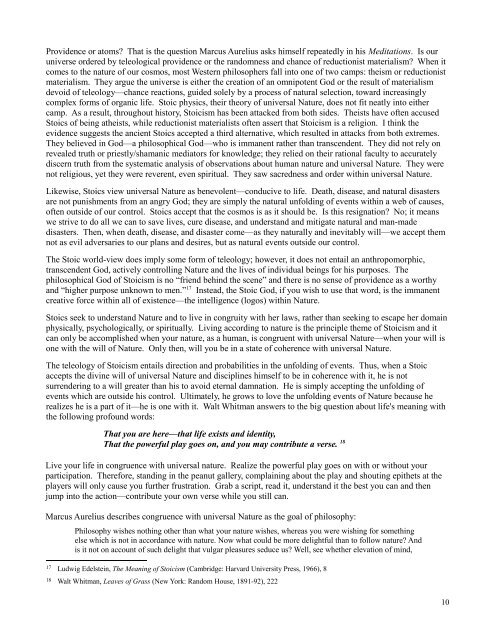Self-Coherence: - College of Stoic Philosophers
Self-Coherence: - College of Stoic Philosophers
Self-Coherence: - College of Stoic Philosophers
You also want an ePaper? Increase the reach of your titles
YUMPU automatically turns print PDFs into web optimized ePapers that Google loves.
Providence or atoms? That is the question Marcus Aurelius asks himself repeatedly in his Meditations. Is ouruniverse ordered by teleological providence or the randomness and chance <strong>of</strong> reductionist materialism? When itcomes to the nature <strong>of</strong> our cosmos, most Western philosophers fall into one <strong>of</strong> two camps: theism or reductionistmaterialism. They argue the universe is either the creation <strong>of</strong> an omnipotent God or the result <strong>of</strong> materialismdevoid <strong>of</strong> teleology—chance reactions, guided solely by a process <strong>of</strong> natural selection, toward increasinglycomplex forms <strong>of</strong> organic life. <strong>Stoic</strong> physics, their theory <strong>of</strong> universal Nature, does not fit neatly into eithercamp. As a result, throughout history, <strong>Stoic</strong>ism has been attacked from both sides. Theists have <strong>of</strong>ten accused<strong>Stoic</strong>s <strong>of</strong> being atheists, while reductionist materialists <strong>of</strong>ten assert that <strong>Stoic</strong>ism is a religion. I think theevidence suggests the ancient <strong>Stoic</strong>s accepted a third alternative, which resulted in attacks from both extremes.They believed in God—a philosophical God—who is immanent rather than transcendent. They did not rely onrevealed truth or priestly/shamanic mediators for knowledge; they relied on their rational faculty to accuratelydiscern truth from the systematic analysis <strong>of</strong> observations about human nature and universal Nature. They werenot religious, yet they were reverent, even spiritual. They saw sacredness and order within universal Nature.Likewise, <strong>Stoic</strong>s view universal Nature as benevolent—conducive to life. Death, disease, and natural disastersare not punishments from an angry God; they are simply the natural unfolding <strong>of</strong> events within a web <strong>of</strong> causes,<strong>of</strong>ten outside <strong>of</strong> our control. <strong>Stoic</strong>s accept that the cosmos is as it should be. Is this resignation? No; it meanswe strive to do all we can to save lives, cure disease, and understand and mitigate natural and man-madedisasters. Then, when death, disease, and disaster come—as they naturally and inevitably will—we accept themnot as evil adversaries to our plans and desires, but as natural events outside our control.The <strong>Stoic</strong> world-view does imply some form <strong>of</strong> teleology; however, it does not entail an anthropomorphic,transcendent God, actively controlling Nature and the lives <strong>of</strong> individual beings for his purposes. Thephilosophical God <strong>of</strong> <strong>Stoic</strong>ism is no “friend behind the scene” and there is no sense <strong>of</strong> providence as a worthyand “higher purpose unknown to men.” 17 Instead, the <strong>Stoic</strong> God, if you wish to use that word, is the immanentcreative force within all <strong>of</strong> existence—the intelligence (logos) within Nature.<strong>Stoic</strong>s seek to understand Nature and to live in congruity with her laws, rather than seeking to escape her domainphysically, psychologically, or spiritually. Living according to nature is the principle theme <strong>of</strong> <strong>Stoic</strong>ism and itcan only be accomplished when your nature, as a human, is congruent with universal Nature—when your will isone with the will <strong>of</strong> Nature. Only then, will you be in a state <strong>of</strong> coherence with universal Nature.The teleology <strong>of</strong> <strong>Stoic</strong>ism entails direction and probabilities in the unfolding <strong>of</strong> events. Thus, when a <strong>Stoic</strong>accepts the divine will <strong>of</strong> universal Nature and disciplines himself to be in coherence with it, he is notsurrendering to a will greater than his to avoid eternal damnation. He is simply accepting the unfolding <strong>of</strong>events which are outside his control. Ultimately, he grows to love the unfolding events <strong>of</strong> Nature because herealizes he is a part <strong>of</strong> it—he is one with it. Walt Whitman answers to the big question about life's meaning withthe following pr<strong>of</strong>ound words:That you are here—that life exists and identity,That the powerful play goes on, and you may contribute a verse. 18Live your life in congruence with universal nature. Realize the powerful play goes on with or without yourparticipation. Therefore, standing in the peanut gallery, complaining about the play and shouting epithets at theplayers will only cause you further frustration. Grab a script, read it, understand it the best you can and thenjump into the action—contribute your own verse while you still can.Marcus Aurelius describes congruence with universal Nature as the goal <strong>of</strong> philosophy:Philosophy wishes nothing other than what your nature wishes, whereas you were wishing for somethingelse which is not in accordance with nature. Now what could be more delightful than to follow nature? Andis it not on account <strong>of</strong> such delight that vulgar pleasures seduce us? Well, see whether elevation <strong>of</strong> mind,17Ludwig Edelstein, The Meaning <strong>of</strong> <strong>Stoic</strong>ism (Cambridge: Harvard University Press, 1966), 818 Walt Whitman, Leaves <strong>of</strong> Grass (New York: Random House, 1891-92), 22210
















